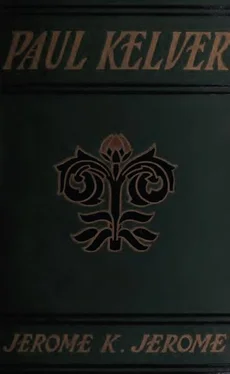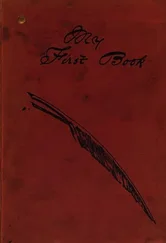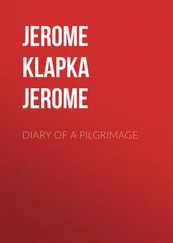Jerome Jerome - Paul Kelver
Здесь есть возможность читать онлайн «Jerome Jerome - Paul Kelver» весь текст электронной книги совершенно бесплатно (целиком полную версию без сокращений). В некоторых случаях можно слушать аудио, скачать через торрент в формате fb2 и присутствует краткое содержание. Город: New York, Год выпуска: 1902, Издательство: Dodd, Mead & Company, Жанр: Классическая проза, на английском языке. Описание произведения, (предисловие) а так же отзывы посетителей доступны на портале библиотеки ЛибКат.
- Название:Paul Kelver
- Автор:
- Издательство:Dodd, Mead & Company
- Жанр:
- Год:1902
- Город:New York
- ISBN:нет данных
- Рейтинг книги:3 / 5. Голосов: 1
-
Избранное:Добавить в избранное
- Отзывы:
-
Ваша оценка:
- 60
- 1
- 2
- 3
- 4
- 5
Paul Kelver: краткое содержание, описание и аннотация
Предлагаем к чтению аннотацию, описание, краткое содержание или предисловие (зависит от того, что написал сам автор книги «Paul Kelver»). Если вы не нашли необходимую информацию о книге — напишите в комментариях, мы постараемся отыскать её.
Paul Kelver — читать онлайн бесплатно полную книгу (весь текст) целиком
Ниже представлен текст книги, разбитый по страницам. Система сохранения места последней прочитанной страницы, позволяет с удобством читать онлайн бесплатно книгу «Paul Kelver», без необходимости каждый раз заново искать на чём Вы остановились. Поставьте закладку, и сможете в любой момент перейти на страницу, на которой закончили чтение.
Интервал:
Закладка:
“Perhaps you are right, dear,” replied my mother; “and of course boys are different from girls.”
Sometimes I would wander Victoria Park way, which was then surrounded by many small cottages in leafy gardens; or even reach as far as Clapton, where old red brick Georgian houses still stood behind high palings, and tall elms gave to the wide road on sunny afternoons an old-world air of peace. But such excursions were the exception, for strange though it may read, the narrow, squalid streets had greater hold on me. Not the few main thoroughfares, filled ever with a dull, deep throbbing as of some tireless iron machine; where the endless human files, streaming ever up and down, crossing and recrossing, seemed mere rushing chains of flesh and blood, working upon unseen wheels; but the dim, weary, lifeless streets—the dark, tortuous roots, as I fancied them, of that grim forest of entangled brick. Mystery lurked in their gloom. Fear whispered from behind their silence. Dumb figures flitted swiftly to and fro, never pausing, never glancing right nor left. Far-off footsteps, rising swiftly into sound, as swiftly fading, echoed round their lonely comers. Dreading, yet drawn on, I would creep along their pavements as through some city of the dead, thinking of the eyes I saw not watching from the thousand windows; starting at each muffled sound penetrating the long, dreary walls, behind which that close-packed, writhing life lay hid.
One day there came a cry from behind a curtained window. I stood still for a moment and then ran; but before I could get far enough away I heard it again, a long, piercing cry, growing fiercer before it ceased; so that I ran faster still, not heeding where I went, till I found myself in a raw, unfinished street, ending in black waste land, bordering the river. I stopped, panting, wondering how I should find my way again. To recover myself and think I sat upon the doorstep of an empty house, and there came dancing down the road with a curious, half-running, half-hopping step—something like a water wagtail's—a child, a boy about my own age, who, after eyeing me strangely sat down beside me.
We watched each other for a few minutes; and I noticed that his mouth kept opening and shutting, though he said nothing. Suddenly, edging closer to me, he spoke in a thick whisper. It sounded as though his mouth were full of wool.
“Wot 'appens to yer when yer dead?”
“If you're good you go to Heaven. If you're bad you go to Hell.”
“Long way off, both of 'em, ain't they?”
“Yes. Millions of miles.”
“They can't come after yer? Can't fetch yer back again?”
“No, never.”
The doorstep that we occupied was the last. A yard beyond began the black waste of mud. From the other end of the street, now growing dark, he never took his staring eyes for an instant.
“Ever seen a stiff 'un—a dead 'un?”
“No.”
“I 'ave—stuck a pin into 'im. 'E never felt it. Don't feel anything when yer dead, do yer?”
All the while he kept swaying his body to and fro, twisting his arms and legs, and making faces. Comical figures made of ginger-bread, with quaintly curved limbs and grinning features, were to be bought then in bakers' shops: he made me hungry, reminding me of such.
“Of course not. When you are dead you're not there, you know. Our bodies are but senseless clay.” I was glad I remembered that line. I tried to think of the next one, which was about food for worms; but it evaded me.
“I like you,” he said; and making a fist, he gave me a punch in the chest. It was the token of palship among the youth of that neighbourhood, and gravely I returned it, meaning it, for friendship with children is an affair of the instant, or not at all, and I knew him for my first chum.
He wormed himself up.
“Yer won't tell?” he said.
I had no notion what I was not to tell, but our compact demanded that I should agree.
“Say 'I swear.'”
“I swear.”
The heroes of my favourite fiction bound themselves by such like secret oaths. Here evidently was a comrade after my own heart.
“Good-bye, cockey.”
But he turned again, and taking from his pocket an old knife, thrust it into my hand. Then with that extraordinary hopping movement of his ran off across the mud.
I stood watching him, wondering where he could be going. He stumbled a little further, where the mud began to get softer and deeper, but struggling up again, went hopping on towards the river.
I shouted to him, but he never looked back. At every few yards he would sink down almost to his knees in the black mud, but wrenching himself free would flounder forward. Then, still some distance from the river, he fell upon his face, and did not rise again. I saw his arms beating feebler and feebler as he sank till at last the oily slime closed over him, and I could detect nothing but a faint heaving underneath the mud. And after a time even that ceased.
It was late before I reached home, and fortunately my father and mother were still out. I did not tell any one what I had seen, having sworn not to; and as time went on the incident haunted me less and less until it became subservient to my will. But of my fancy for those silent, lifeless streets it cured me for the time. From behind their still walls I would hear that long cry; down their narrow vistas see that writhing figure, like some animated ginger-bread, hopping, springing, falling.
Yet in the more crowded streets another trouble awaited me, one more tangible.
Have you ever noticed a pack of sparrows round some crumbs perchance that you have thrown out from your window? Suddenly the rest of the flock will set upon one. There is a tremendous Lilliputian hubbub, a tossing of tiny wings and heads, a babel of shrill chirps. It is comical.
“Spiteful little imps they are,” you say to yourself, much amused.
So I have heard good-tempered men and women calling out to one another with a laugh.
“There go those young devils chivvying that poor little beggar again; ought to be ashamed of theirselves.”
But, oh! the anguish of the poor little beggar! Can any one who has not been through it imagine it! Reduced to its actualities, what was it? Gibes and jeers that, after all, break no bones. A few pinches, kicks and slaps; at worst a few hard knocks. But the dreading of it beforehand! Terror lived in every street, hid, waiting for me, round each corner. The half-dozen wrangling over their marbles—had they seen me? The boy whistling as he stood staring into the print shop, would I get past him without his noticing me; or would he, swinging round upon his heel, raise the shrill whoop that brought them from every doorway to hunt me?
The shame, when caught at last and cornered: the grinning face that would stop to watch; the careless jokes of passers-by, regarding the whole thing but as a sparrows' squabble: worst of all, perhaps, the rare pity! The after humiliation when, finally released, I would dart away, followed by shouted taunts and laughter; every eye turned to watch me, shrinking by; my whole small carcass shaking with dry sobs of bitterness and rage!
If only I could have turned and faced them! So far as the mere bearing of pain was concerned, I knew myself brave. The physical suffering resulting from any number of stand-up fights would have been trivial compared with the mental agony I endured. That I, the comrade of a hundred heroes—I, who nightly rode with Richard Coeur de Lion, who against Sir Lancelot himself had couched a lance, and that not altogether unsuccessful, I to whom all damsels in distress were wont to look for succour—that I should run from varlets such as these!
My friend, my bosom friend, good Robin Hood! how would he have behaved under similar circumstances? how Ivanhoe, my chosen companion in all quests of knightly enterprise? how—to come to modern times—Jack Harkaway, mere schoolboy though he might be? Would not one and all have welcomed such incident with a joyous shout, and in a trice have scattered to the winds the worthless herd?
Читать дальшеИнтервал:
Закладка:
Похожие книги на «Paul Kelver»
Представляем Вашему вниманию похожие книги на «Paul Kelver» списком для выбора. Мы отобрали схожую по названию и смыслу литературу в надежде предоставить читателям больше вариантов отыскать новые, интересные, ещё непрочитанные произведения.
Обсуждение, отзывы о книге «Paul Kelver» и просто собственные мнения читателей. Оставьте ваши комментарии, напишите, что Вы думаете о произведении, его смысле или главных героях. Укажите что конкретно понравилось, а что нет, и почему Вы так считаете.












